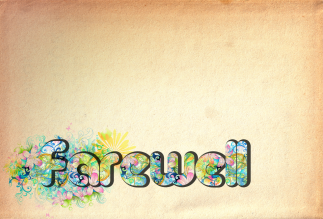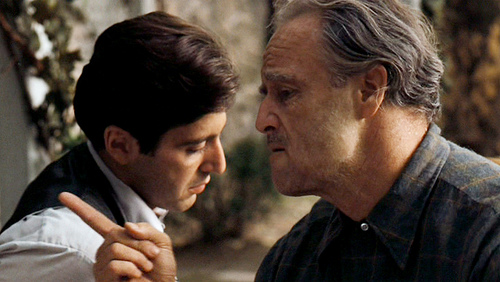
Wow. I guess this is the “Farewell” post. It’s a little bit hard letting go. Thanks to everyone who listened to my insanity and helped me feel a little more sane over the past couple years. (Because, “Yes, Virgina, there are bad Witches.”) I hope you hang out to hear Hazey tell her stories too. While she’s a site younger than I am, she has a good head on her shoulders and quite a yarn to spin.
Have a happy and prosperous 2013–pop over to http://www.EhshaApple.Wordpress.com if you haven’t already, you can pick up my travels post-Bad Witchery over there.
I’m sure, as things go , I’ll be back to poke my nose in from time to time. But until then, I have some blogging advice for Hazey, The New Bad; y’all feel free to eavesdrop.
Twelve points for twelve months.
1) There’s no need to tell your story all at once. Folks are happy to listen if you are entertaining; therefore, episodes are better than a movie-length post.
And you’ve got enough to say that you don’t have to be repetitive.
2) Poioumena, parables, metaphors, and fairy-tales are good for telling more of the whole truth than can be put in words. Folks identify with certain stories and know how those stories “feel” so you don’t have to work so hard to put them in your pointy shoes.
3) That said—keep control of your metaphors. Ain’t nothing worse than a metaphor what can’t stay on track. Plenty of “Bad” metaphors out there have run amok of their authors and shown folks that the emperor is truly and completely nekid. Make your logic hang together or folks’ll notice. Our reader is smarter than the average bear (and they know how to make sense of a film’s ending).
4) Metaphors are OK. But don’t lie. Just don’t. It ain’t worth it; the truth is so much more frightening and entertaining anyhow.
5) You aren’t “The Bad.” Remember you are just reporting on “The Bad.” And you have seen that shite as up close and personal as any of Stephen King’s protagonists.
And, as we continue to see–some folks are always gonna think it’s about them. You can’t second guess yourself. If it stings them, must mean they have a guilty conscience–ain’t nothing you can do about that.
6) That said, this is not about revenge; this is about warning others that Pennywise is not actually a clown and that they shouldn’t patronize Leland Gaunt’s little shop of horrors.
7) You are learning loads of new things right now. Information is pouring in and out of you at break-neck speed at this point in your Witchy career. You should share that information and all the great new lessons you are learning—but you should also know when to STFU. When it comes to “secrets,” remember that your audience understands that there are things which cannot be said.
8) Don’t dicker with your numbers. Nobody cares in the end. I pulled up a “Bad” blog not too long ago which purported well over two-thousand “followers.” The little box came up and asked if I wanted to join 627. Now that’s just embarrassing. We keep our numbers under wraps here for a few reasons: A) The number that pops up here is grossly inaccurate. I’ll explain the logistics of Tumblr, Twitter, FB, etc. later. B) If it hurts someone else’s pride that we have X and they have Y—enough so that they have to make smack-talk about it Online—then we will just remove the info. We ain’t out to rub it in.
Speaking of (A), everything posts to a parallel site on Tumblr. We can discuss Facebook and Twitter and the WP stats function later. It’s not interesting enough to go here.
9) Speaking of “followers,” your audience does not “follow” you—you are not their “leader.” They are your audience, your sounding board, your patient ally, and occasional (when necessary) adversary. Do not presume to make them your subordinates as other bloggers have done. You’ll do better to have 1500 “friends” than 600 “underlings.” (Hell, I’d rather have 600 friends than 1500 underlings.) If no one else ever visits, I’ll be here right by your side, reading, laughing, crying, goading.
10) Speaking of things with which you should not dicker—readers’ comments are sacred. Only SPAM gets deleted. Otherwise, how’s anyone ever gonna trust you?
11) Never blog UI. I believe that’s what the “Save Draft” button was specifically designed for. Trust me. Sometimes you don’t want to publish that shite until you are sober. And rehydrated. And maybe caffeinated—but that’s a whole ‘nother problem.
12) Finally—but most importantly—have fun. This is for blowing off steam, not for generating pressure.
I adore you. I’m already proud of you.
Ready? Steady? Go! (Take this bad broom and fly!)

Sage advice from the original.

 assertion that convincing scads of people that positive thought will solve all of their problems, we set them up for failure—and then self-blame—and then even more tribulations. Though I like the overall idea and find that herlogic hangs together, I have some serious issues with Ehrenreich’s language: she’s caustic and makes some fairly cheap-shots at other authors. I don’t believe that the best way to critique positive-thinking is with negativity and vitriol. The book is short, but if you aren’t inclined to read even that much, have a look at these reviews for the gist:
assertion that convincing scads of people that positive thought will solve all of their problems, we set them up for failure—and then self-blame—and then even more tribulations. Though I like the overall idea and find that herlogic hangs together, I have some serious issues with Ehrenreich’s language: she’s caustic and makes some fairly cheap-shots at other authors. I don’t believe that the best way to critique positive-thinking is with negativity and vitriol. The book is short, but if you aren’t inclined to read even that much, have a look at these reviews for the gist: